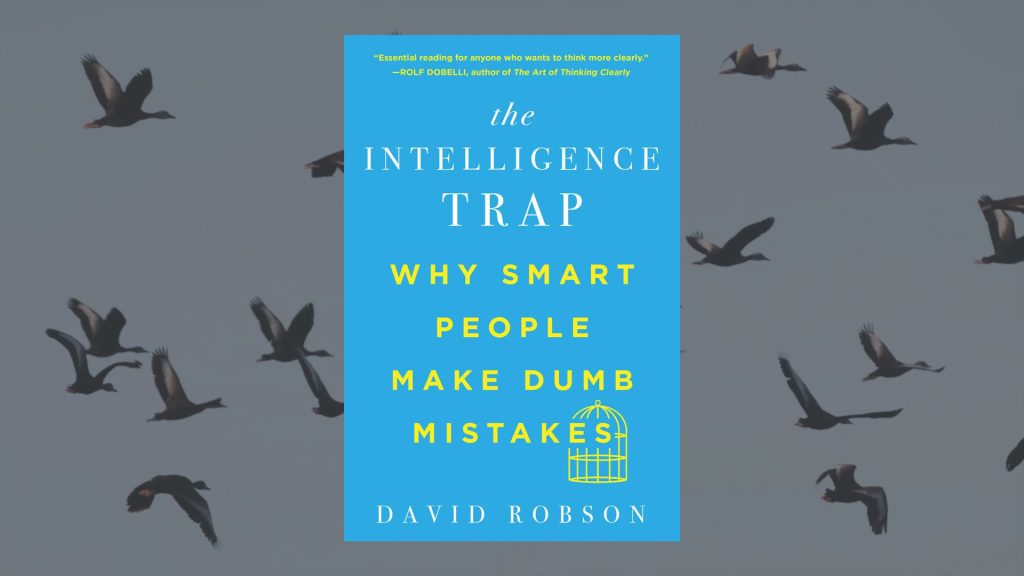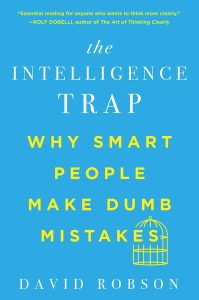
Welcome to my monthly book recommendation for September! On the first day of each month, I’ll recommend a book, new or old, fiction or nonfiction, pulled from my own reading experience. In my recommendation, I’ll introduce the book, discuss why I found reading it worthwhile, and what major themes the book touches upon. I won’t include any major spoilers, but I may discuss some of the characters and specific details or locations from within the book. My recommendation for September, 2024 is The Intelligence Trap, authored by David Robson.
The Intelligence Trap - David Robson
Available on Amazon
 Authors: David Robson
Authors: David Robson
Genres: Nonfiction
Description:
The Intelligence Trap explores cutting-edge ideas in our understanding of intelligence and expertise, including “motivated reasoning,” “meta-forgetfulness,” and “functional stupidity.” David Robson reveals the surprising ways that even the brightest minds and most talented organizations can go wrong? From some of Thomas Edison’s worst ideas to failures at NASA―while offering practical advice to avoid mistakes based on the timeless lessons of Benjamin Franklin, Richard Feynman, and Daniel Kahneman.
My Thoughts
The Intelligence Trap discusses the topics of intelligence, ignorance, and dogmatism from a fresh, unique perspective. I originally purchased the book because I was intrigued by its subtitle: why smart people make dumb mistakes, and throughout my time reading it, I found that it successfully elucidated this phenomenon with its breakdown of multiple types of intellectual dishonesties, mistakes, and pitfalls. If you’ve ever wondered why a smart friend, intelligent figure, or historical genius has continuously acted in an irrational, or even downright stupid manner, this book will help you find the answers.
As I was reading, I was happy to find that the author discussed concepts that I’d personally come to realize throughout my interactions with others, as well as myself, which I’d not seen in writing prior to this book, at least not in a succinct manner. Most notably, the author discusses functional stupidity, a form of stupidity that is self-imposed by an individual’s conscious choice to never reflect inward and evaluate their beliefs and assumptions at a critical level.
The words “idiot” and “stupid,” often used synonymously, are thrown around and hurled as insults during arguments or condemnation of one’s actions or state of being, but I’ve found that, when used as such, they lack clarity and precision. Is a person who can barely get a C on a math test stupid if they make wise decisions throughout their lives? Is a person who can develop sophisticated algorithms intelligent if they continuously squander their money and blame the rest of the world for their financial problems? In my opinion, the person who deserves to be called “stupid” is the person who imposes it upon themselves with a lack of ownership and accountability for their own beliefs and actions, one whose lack of such accountability leads them to make stupid decisions that harm themselves and others. The author’s concept of functional stupidity encapsulates this spot-on, and I was happy to see its inclusion in the book.
The Intelligence Trap also covers topics I’d not thought of myself in succinct terms. The idea of earned dogmatism or earned ignorance captures the essence of the phenomenon that some people who’ve achieved great success for themselves, particularly in an intellectual field, can and do hold blatantly irrational, contradictory beliefs. The author states that sometimes, they feel that they’ve earned it. Their success in their field entitles them to turn off their critical evaluations, their self-reflections, of their beliefs for some particular belief system. After all, they’ve earned it, so they should get to enjoy the perceived fruits of their assumptions and the joys that come with it. Earned dogmatism may seem innocuous when viewed at the individual level, but it can become toxic, even dangerous, when it is espoused by groups of people.
I was pleasantly surprised to see the author’s inclusion of Arthur Conan Doyle’s series of blunders in his pursuit to prove that fairies are real, based purely on photographs taken by two children. If you’ve read my book Method Matters, you’ll recall that I dedicated a small portion of the book to this topic myself. I enjoyed reading Robson’s take on this series of events and his reflections on where Doyle went wrong in his quest. I found that, though our assessments had significant overlap, he did raise some ideas that I did not in my book, and vice versa, which I consider to be a good thing.
Overall, I do recommend this book to anyone who is curious about the nature of intelligence and its shortcomings. Unfortunately, I didn’t have enough space in this review to discuss all of the pertinent concepts the book raises, including motivated reasoning and discussions pertaining to the increased vulnerability that intelligence can bring, but these, and more, lend themselves to the overall quality and completeness of The Intelligence Trap. I hope that I did include enough to express the value of this book, and I do hope that you consider picking up a copy for yourself.